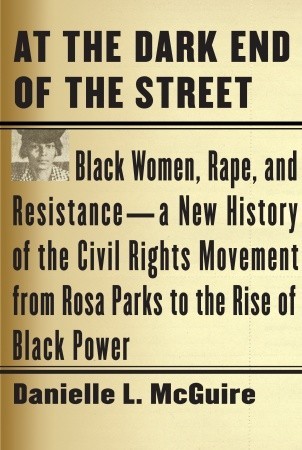Book Review: At the Dark End of the Street by Danielle L. McGuire
Book: At the Dark End of the Street: Black Women, Rape, and Resistance–a New History of the Civil Rights Movement from Rosa Parks to the Rise of Black Power by Danielle L. McGuire
Genre: History
Publisher: Alfred A. Knopf
Publication date: 2010
Pages: 324
Source: Library
 Summary: At the Dark End of the Street examines the Civil Rights Movement from a different perspective than what we learned in history class. Since the times of slavery, black women who were raped by white men had little recourse. Danielle McGuire looks at active resistance to this terror tactic by women beginning in the 1940s. These women bravely testified to their experience, even when there was little hope of justice and great potential of bringing retribution on themselves or the families. In the first story in the book, Rosa Parks is present as an NAACP investigator, recording and validating one woman’s statement of her rape experience. Gradually, testimonies like hers brought about the developments in confidence and community required for an effective Civil Rights Movement.
Summary: At the Dark End of the Street examines the Civil Rights Movement from a different perspective than what we learned in history class. Since the times of slavery, black women who were raped by white men had little recourse. Danielle McGuire looks at active resistance to this terror tactic by women beginning in the 1940s. These women bravely testified to their experience, even when there was little hope of justice and great potential of bringing retribution on themselves or the families. In the first story in the book, Rosa Parks is present as an NAACP investigator, recording and validating one woman’s statement of her rape experience. Gradually, testimonies like hers brought about the developments in confidence and community required for an effective Civil Rights Movement.
Rosa Parks emerges as an entirely different character than the meek woman with tired feet–a story we tell children about the precipitating event of the boycott of the Montgomery system.
Rosa Parks was a militant race woman, a sharp detective, and an antirape activist long before she became the patron saint of the bus boycott.
By the time this book gets to the 1955 bus boycott, it’s quite clear that Rosa Parks knew that she could be just the symbol that the Civil Rights Movement needed at that time. Her act was less about that day’s physical fatigue and more about a general weariness about how she and her black sisters and brothers were treated.
Thoughts: At the Dark End of the Street provided great discussion material for the Diversity Book Club last night. We all learned something, whether we were old enough to have read about the Civil Rights Movement in the daily newspapers or young enough to have learned about it in history class.
Appeal: This is a serious academic book of forgotten history. All the names of the women who probably should have appeared in other books are written here. This makes the reading a little slow to start–it takes a while to figure out who are the major characters. I was about 70 pages in before I felt fully invested in the story.
It’s probably obvious from the word “rape” in the subtitle, but there are many disturbing scenes in At the Dark End of the Street, a startling number. This is a difficult but important book, adding to our understanding of everything from the cause of the great migration (described in another book we read, The Warmth of Other Suns by Isabel Wilkerson) to the anger surrounding the Trayvon Martin case.
Reviews: Nicole at Linus’s Blanket discussed At the Dark End of the Streetby Danielle McGuire in a great 2010 post arguing for honesty in the teaching of history, complete with the feistier version of Rosa Parks we meet in this book: December 1st – Rosa Parks Day.
Have you read this book? What did you think?


Sounds like a heavy read, but an important one. Great review, it’s not the kind of book I would usually read, but I will suggest for my book club, would bring good discussion.
Wow, I had not heard of this book, but I may have to give it a shot. It sounds like it will be a hard read–emotionally, I mean–but (like Carol said) an important one. Thank you for sharing this review!
Oh wow, what a great sounding book Joy!
Great book – the view on Rosa Parks sounds really interesting. Great review, definitely makes me want to read it. I’ve put it on hold at our library.
Great review, definitely makes me want to read it. I’ve put it on hold at our library.
Thanks for linking to my post Joy. This book was such an eye opener. Rosa Parks was/is always a rolel model, but this book showed her teeth. I won’t ever think of the Civil Rights Movement in the same way again.
Pingback:Book Club Selection Meeting #SundaySalon #WeNeedDiverseBooks | Joy's Book Blog